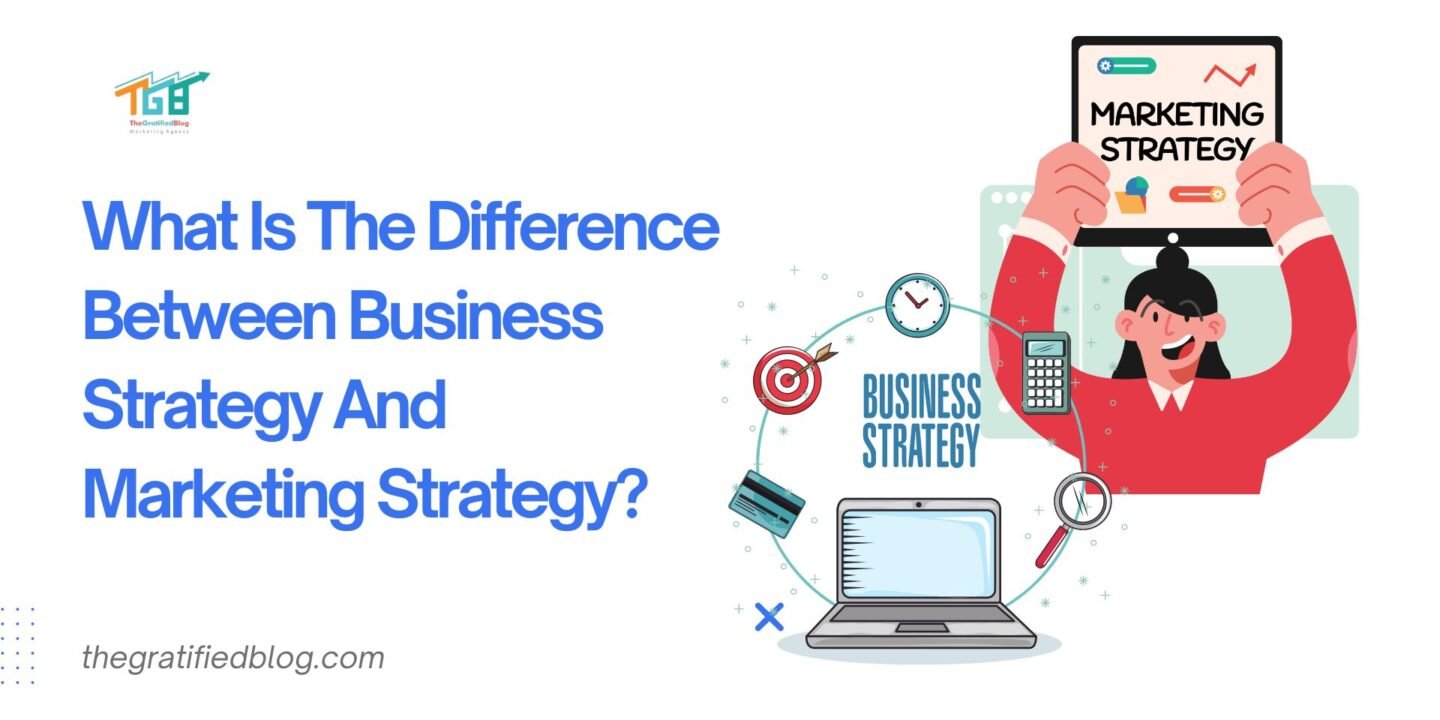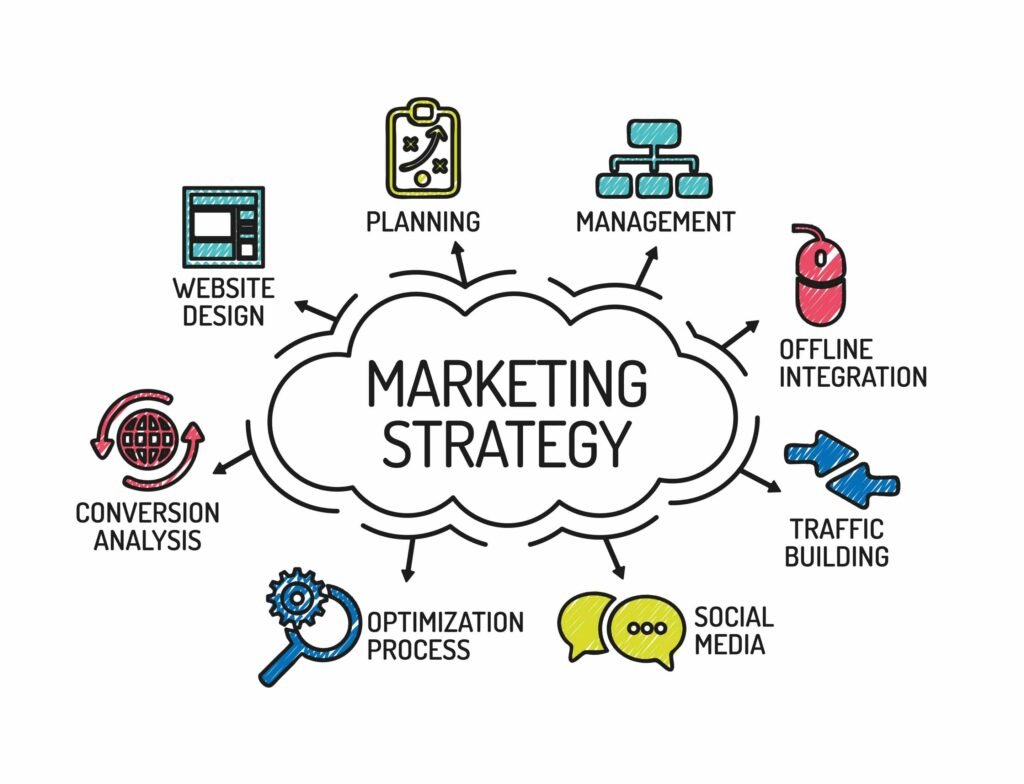
In the labyrinth of corporate intricacies, two terms often swirl around, sometimes used interchangeably, causing confusion among professionals and enthusiasts: Business Strategy and Marketing Strategy. While both serve as guiding lights for an organization’s success, they embody distinct roles and functions within the grand scheme. Understanding the nuances between these two pillars is essential for seasoned executives, aspiring entrepreneurs, and marketing mavens navigating the competitive landscape. Let’s embark on a journey, “What is the difference between business strategy and marketing strategy?” to unravel the mysteries and distinctions between business strategy and marketing strategy.
Definition Of Business Strategy
Business strategy is a pillar of corporate strategy that focuses on overall business goals, objectives, and long-term planning. In contrast, marketing strategy focuses on creating, communicating, delivering, and exchanging offerings that have value for customers. It involves analyzing markets, competitors, and trends to formulate strategies for sustainable competitive advantage.
Effective business strategy aligns with the company’s mission and vision, guiding actions to optimize performance and foster growth. It’s a dynamic process that adapts to changing circumstances, leveraging strengths to capitalize on opportunities while mitigating risks.
Ultimately, it’s about creating value for stakeholders and maintaining relevance in a competitive landscape. Business strategy determines what actions a company will take to achieve its objectives.
Components Of A Business Strategy
A robust business strategy encompasses various key components that are vital for guiding the overall direction of a company. These components often include a clear mission statement, defined objectives, an analysis of the competitive landscape, a thorough understanding of the target market, and a strategic plan for achieving sustainable growth.
By carefully crafting a solid business brand and marketing strategy, organizations can effectively position themselves in the market, capitalize on opportunities, and navigate challenges successfully.
Importance Of A Business Strategy
A well-defined business strategy is the cornerstone of any successful company. It is a roadmap that guides decision-making processes, resource allocation, and goal-setting. By establishing a clear business strategy, organizations can align their efforts toward a shared vision, optimize their operations, and effectively adapt to changes in the market environment.
Furthermore, a robust product and business strategy enables companies to differentiate themselves from competitors, identify and leverage new opportunities, and ultimately achieve long-term sustainability and growth.
Definition Of Marketing Strategy

While a business strategy focuses on the company’s overall direction and goals, a marketing strategy is more specific and concentrates on how to reach and engage customers to drive sales and revenue. Marketing strategies involve segmenting target audiences, selecting appropriate communication channels, defining messaging and branding, and setting pricing and promotional strategies. A well-crafted plan is a marketing strategy that aligns with the overarching business strategy and aims to create customer value while achieving the company’s objectives.
Components Of A Marketing Strategy
Marketing strategy components include market research to understand customer needs and preferences, creating a unique value proposition, setting clear and measurable marketing objectives, developing a comprehensive marketing mix involving product, price, place, and promotion strategies, and establishing a budget to support implementation.
By carefully crafting each element of your marketing strategy and tactics, you can effectively target and engage your audience while driving business growth.
Importance Of A Marketing Strategy
A well-defined marketing strategy is crucial for businesses as it provides a roadmap to effectively reach their target audience. It helps create brand awareness, generate leads, increase customer engagement, and ultimately boost sales and revenue.
Without a solid marketing strategy, businesses may struggle to differentiate themselves in a competitive market and may miss out on valuable growth opportunities.
Businesses can enhance their overall performance and achieve long-term success by investing time and resources into developing a comprehensive marketing strategy.
What is the difference between business strategy and marketing strategy?
While a marketing strategy focuses on promoting products or services to target customers, a business strategy encompasses the overall direction and goals of the organization. Business strategy defines how a company will achieve long-term success, including factors like market positioning, competitive advantage, and resource allocation.
On the other hand, a marketing strategy details the specific tactics and initiatives to promote products and attract customers. Understanding these strategies’ distinctions is essential for aligning marketing efforts with broader business objectives.
Business strategy and marketing strategy are interrelated but distinct concepts within the realm of strategic management. Here’s how they differ:
- Scope and Focus:
- Business Strategy: Business strategy encompasses an entire organization’s overall direction and scope. It involves decisions about what products or services to offer, which markets to enter, how to allocate resources, and how to gain a competitive advantage.
- Marketing Strategy: Marketing strategy, on the other hand, focuses specifically on promoting and selling a company’s products or services. It involves decisions about target markets, positioning, pricing, promotion, and distribution channels.
- Objectives:
- Business Strategy: The primary objective of business strategy is to achieve the organization’s long-term goals and objectives, such as growth, profitability, sustainability, or market leadership.
- Marketing Strategy: The main objective of marketing strategy is to support achieving business goals by creating awareness, generating demand, and ultimately driving sales of products or services.
- Time Horizon:
- Business Strategy: Business strategy typically operates on a longer time horizon, often spanning several years or even decades. It involves setting broad goals and designing plans to achieve them over the long term.
- Marketing Strategy: Marketing strategy operates on a shorter time horizon than business strategy. It involves tactical decisions to achieve marketing objectives within a specified period, usually one to three years.
- Components:
- Business Strategy: Components of business strategy may include diversification, mergers and acquisitions, cost leadership, differentiation, innovation, and strategic alliances.
- Marketing Strategy: Components of marketing strategy may include market segmentation, targeting, positioning, branding, pricing strategies, promotional campaigns, and distribution channel strategies.
- Flexibility:
- Business Strategy: Business strategy tends to be relatively stable over time and is less responsive to short-term market fluctuations. Changes to business strategy often require significant deliberation and planning.
- Marketing Strategy: Marketing strategy is more adaptable and responsive to consumer preferences, market conditions, and competitive dynamics changes. Marketers often adjust their strategies in real-time based on feedback and performance metrics.
Integrating Business And Marketing Strategies
A successful business thrives on seamlessly integrating both business and marketing strategies. This harmonious alignment ensures that marketing efforts resonate with the broader organizational goals, driving sustainable growth and competitive advantage.
By intertwining a business strategy’s overarching vision with the targeted initiatives of a marketing strategy, companies can effectively reach their target market, maintain a competitive edge, and achieve long-term success.
Implementing Effective Strategies For Business Success
Effective implementation of both business and marketing strategies is crucial to business success. Aligning business goals with marketing tactics requires a deep understanding of your target market, competitive landscape, and industry trends.
When integrating these strategies, consider leveraging market research to inform your decision-making process, setting clear objectives, and establishing key performance indicators to measure success. By consistently evaluating and refining your strategies based on performance data, you can adapt to changing market dynamics and stay ahead of the competition.
Conclusion
In the intricate tapestry of corporate endeavors, business and marketing strategies stand as pillars of organizational success, each playing a distinct yet complementary role in driving growth and competitiveness. While business strategy sets the overarching direction and priorities, marketing strategy translates vision into action, engaging customers and capturing market opportunities.
Understanding the nuances between these two disciplines is paramount for executives and marketers alike, enabling them to navigate the complexities of the modern business landscape with clarity and purpose. As organizations seek sustained prosperity, harmonizing business strategy with marketing strategy will remain a cornerstone of strategic excellence and market leadership.








No Comments